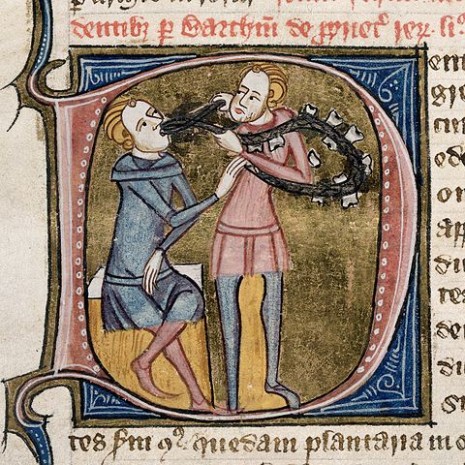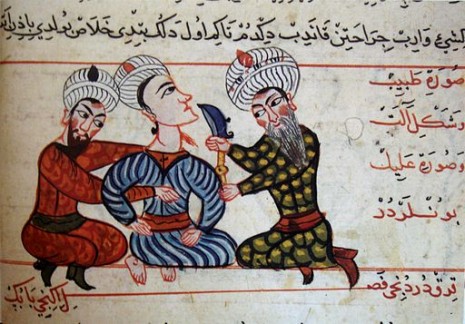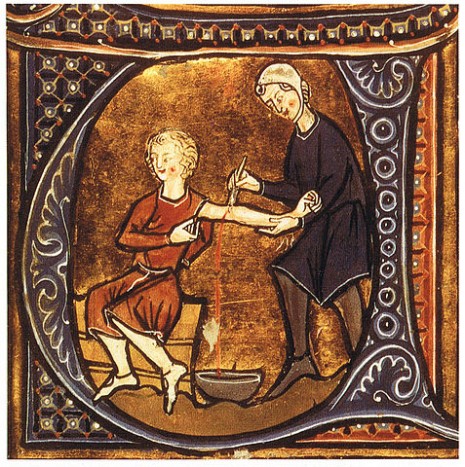 By now it’s pretty well-accepted among medieval historians that the civilizations most responsible for preserving ancient Greek and Roman scholarship after the fall of the Roman Empire were the Arabs. Crusader-knights witnessed firsthand how much more advanced many of the cities of the East were. Besides their magnificent libraries storing this ancient knowledge, Constantinople, Damascus, and Baghdad had much more sophisticated art, architecture, and hygiene than their European counterparts did.
By now it’s pretty well-accepted among medieval historians that the civilizations most responsible for preserving ancient Greek and Roman scholarship after the fall of the Roman Empire were the Arabs. Crusader-knights witnessed firsthand how much more advanced many of the cities of the East were. Besides their magnificent libraries storing this ancient knowledge, Constantinople, Damascus, and Baghdad had much more sophisticated art, architecture, and hygiene than their European counterparts did.
Medieval medicine invited yet another dismal comparison. Here’s a passage written by a 12th-century Arab doctor who’d been called in to consult with his European counterparts. Warning: it’s not for the faint of heart:
 They brought before me a knight in whose leg an abscess had grown; and a woman afflicted with imbecility. To the knight I applied a small poultice until the abscess opened and became well; and the woman I put on diet and made her humor wet. Then a Frankish physician came to them and said, “This man knows nothing about treating them.” He then said to the knight, “Which wouldst thou prefer, living with one leg or dying with two?” The latter replied, “Living with one leg.” The physician said, “Bring me a strong knight and a sharp ax.” A knight came with the ax. And I was standing by. Then the physician laid the leg of the patient on a block of wood and bade the knight strike his leg with the ax and chop it off at one blow. Accordingly he struck it- while I was looking on-one blow, but the leg was not severed. He dealt another blow, upon which the marrow of the leg flowed out and the patient died on the spot. He then examined the woman and said, “This is a woman in whose head there is a devil which has possessed her. Shave off her hair.” Accordingly they shaved it off and the woman began once more to cat their ordinary diet-garlic and mustard. Her imbecility took a turn for the worse. The physician then said, “The devil has penetrated through her head.” He therefore took a razor, made a deep cruciform incision on it, peeled off the skin at the middle of the incision until the bone of the skull was exposed and rubbed it with salt. The woman also expired instantly. Thereupon I asked them whether my services were needed any longer, and when they replied in the negative I returned home, having learned of their medicine what I knew not before.*
They brought before me a knight in whose leg an abscess had grown; and a woman afflicted with imbecility. To the knight I applied a small poultice until the abscess opened and became well; and the woman I put on diet and made her humor wet. Then a Frankish physician came to them and said, “This man knows nothing about treating them.” He then said to the knight, “Which wouldst thou prefer, living with one leg or dying with two?” The latter replied, “Living with one leg.” The physician said, “Bring me a strong knight and a sharp ax.” A knight came with the ax. And I was standing by. Then the physician laid the leg of the patient on a block of wood and bade the knight strike his leg with the ax and chop it off at one blow. Accordingly he struck it- while I was looking on-one blow, but the leg was not severed. He dealt another blow, upon which the marrow of the leg flowed out and the patient died on the spot. He then examined the woman and said, “This is a woman in whose head there is a devil which has possessed her. Shave off her hair.” Accordingly they shaved it off and the woman began once more to cat their ordinary diet-garlic and mustard. Her imbecility took a turn for the worse. The physician then said, “The devil has penetrated through her head.” He therefore took a razor, made a deep cruciform incision on it, peeled off the skin at the middle of the incision until the bone of the skull was exposed and rubbed it with salt. The woman also expired instantly. Thereupon I asked them whether my services were needed any longer, and when they replied in the negative I returned home, having learned of their medicine what I knew not before.*
*From the autobiography of Usamah (1095-1188), a Muslim warrior and courtier, who fought against the Crusaders with Saladin. courtesy of the Medieval Sourcebook http://www.fordham.edu/halsall/source/usamah2.html
Images:
James le Palmer Omne Bonum, 1360-1375 via Wikimedia
Chirurgical Operation, Turkish manuscript, 15th Century via Wikimedia
Bloodletting, The Medieval Cookbook via Wikimedia